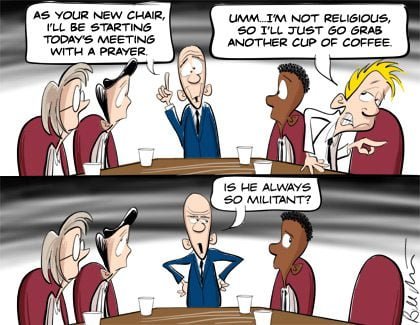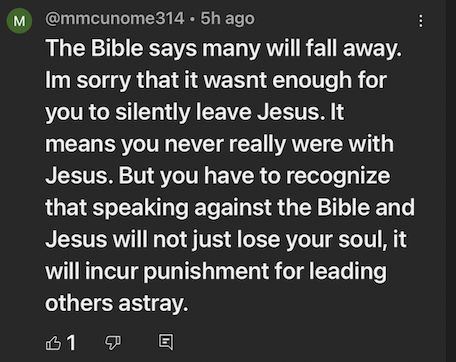
Hey, Jesus,
You and your religion (Christianity) have a PR problem. Evangelicals claim that you wrote the Bible — remember, Jesus is God — so I conclude that you agree with and condone everything written in it. Your followers have cooked up all sorts of apologetical tricks to absolve you of culpability for the decidedly immoral behaviors attributed to you in the Bible. These fail, of course, because you are God, and as the sovereign God of the universe, you had and still have the power to change what happens on Earth and in the lives of its inhabitants. Again, apologists cook up all sorts of lame excuses for the violence and immorality attributed to you in the Bible, but the fact remains that you are God, and you have the power to change circumstances and outcomes. Your devoted followers claim humans have free will, making them culpable for what you commanded them to do. I have no doubt, Jesus, that if Abraham had murdered his son Isaac on your command, modern-day apologists would find ways to absolve you of all accountability. Awesome gig, Jesus. Much like the current American king, Donald Trump, you are free to issue executive orders without any concern for what might happen as a result of your orders.
Jesus, I heard countless stories in Sunday school about how much you love children. Countless American children have sung the song “Jesus Loves the Little Children”:
Jesus loves the little children,
All the children of the world.
Red and yellow, black and white,
All are precious in His sight,
Jesus loves the little children of the world.
I gotta wonder, Jesus, do you really love all the little children in the world? I have my doubts.
The book of Exodus records the Ten Plagues that you plagued Pharaoh and the Egyptians with. In Exodus 11:1-6, we find your tenth plague, Jesus. Do you remember what you did? I do:
The Lord said to Moses, “I will bring one more plague upon Pharaoh and upon Egypt; afterward, he will let you go from here; indeed, when he lets you go, he will drive you away. Tell the people that every man is to ask his neighbor and every woman is to ask her neighbor for objects of silver and gold.” The Lord gave the people favor in the sight of the Egyptians. Moreover, Moses himself was a man of great importance in the land of Egypt, in the sight of Pharaoh’s officials and in the sight of the people. Moses said, “Thus says the Lord, ‘About midnight I will go out through Egypt. Every firstborn in the land of Egypt shall die, from the firstborn of Pharaoh who sits on his throne to the firstborn of the female slave who is behind the handmill and all the firstborn of the livestock. Then there will be a loud cry throughout the whole land of Egypt, such as has never been or will ever be again.
According to the book you wrote, Jesus, you killed the firstborn of every family except those who killed animals and put their blood over the doorposts of their homes. Uncounted Egyptian firstborn children were killed, along with the firstborn of every female slave and the firstborn of the livestock. Geez, Jesus, what did the animals ever do to you?
Throughout the Bible, Jesus, we find stories of God — that’s you, in case you need to be reminded — commanding the Israelites to murder the children, babies, and fetuses of their enemies. Your chosen ones sure were bloodthirsty killers. Imagine if they had followed your command to love your enemies, Jesus? Explain to me, Jesus, all the bloodshed recorded in the Bible with your command to slaughter their enemies, including children.
Even your birth was celebrated by Herod killing all the male children under the age of two. Couldn’t you do anything about this, Jesus? Evangelicals say you know everything and are everywhere. They say you know the end from the beginning. Nothing escapes you, yet it seems you were AWOL when Herod slaughtered the innocent ones.
Even in the New Testament, Jesus, you are portrayed in the book of Revelation as a blood-thirsty deity. More slaughter, more deaths of innocent children, babies, and fetuses. From cover to cover, Jesus, you are portrayed as a deity who uses the murder of children to punish and judge offending adults and nations. This confuses me, Jesus. I thought you didn’t punish people for bad behavior toward others; that each of us is accountable for our own sins.
So, I ask you, Jesus, is it ever okay to kill children?
I await your response, Jesus. And while I am waiting, you might want to consider what to say about the genocide your chosen people are perpetrating on the Palestinian people. The Israelis have murdered thousands of children in the name of protecting and controlling the land the Bible says you gave them centuries ago.
I ask you again, Jesus, why?

Bruce Gerencser, 68, lives in rural Northwest Ohio with his wife of 47 years. He and his wife have six grown children and sixteen grandchildren. Bruce pastored Evangelical churches for twenty-five years in Ohio, Texas, and Michigan. Bruce left the ministry in 2005, and in 2008 he left Christianity. Bruce is now a humanist and an atheist.
Your comments are welcome and appreciated. All first-time comments are moderated. Please read the commenting rules before commenting.
You can email Bruce via the Contact Form.










